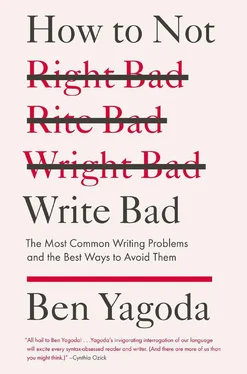ii.Students also commonly leave out the comma after a modifying phrase or dependent clause.
[ By instituting all these new rules so soon after the start of the semester the university is creating chaos. ]
By instituting all these new rules so soon after the start of the semester, the university is creating chaos.

[ When the time is right to introduce a campaign the public relations department will get busy. ]
When the time is right to introduce a campaign, the public relations department will get busy.
Note that this rule holds even when the modifying phrase or clause doesn’t start out the sentence.
[ Carson tried to slip into the conference unnoticed, but since he was wearing a blindingly white suit that didn’t happen. ]
Carson tried to slip into the conference unnoticed, but since he was wearing a blindingly white suit, that didn’t happen. *
You can’t go wrong in using a comma after a modifying phrase or dependent clause. However, in the case of a very short phrase — three words or less, and especially in the case of time elements — it can be okay or even preferable to leave the comma out.
Tomorrow I’ll be home.
Nowadays people leave out commas when they can get away with it.
But note that even with a short intro, a comma is often needed to avoid ambiguity. Scrutinize the sentence to find out.
[ However last night’s performance was a triumph. ]
However, last night’s performance was a triumph.
[ Despite the law students tailgated in greater numbers than last year. ]
Is the writer talking about law students? No. So:
Despite the law, students tailgated in greater numbers than last year.
iii.When a sentence consists of two or more independent clauses (groups of words that can stand on their own as a sentence) joined by a conjunction, such as and or but , put a comma before (but not after) the conjunction
[ I waited in the terminal for two and a half hours but the bus never came. ]
I waited in the terminal for two and a half hours, but the bus never came.
As in section ii., the comma can sometimes be omitted when the clauses are very short (and there’s no confusion or ambiguity). But you can never go wrong in using it.
She likes me but I like her roommate.
She likes me, but I like her roommate.
c. But, a Comma Feels Right!
Roughly at the beginning of the twenty-first century, I began to see a lot of sentences like:
[ But, I don’t agree. ]
And:
[ And, using a comma this way is weirdly popular. ]
By now, students put a comma in that spot more often than they don’t. Commas after sentence-starting But s, And s, and Yet s have even started to show up in Associated Press dispatches and New York Times articles, as well as in blogs and other writing on the Web. I think people use commas in this spot to mimic the pause they might insert when speaking such sentences. But for the last 150 years or so, punctuation rules have been based on grammar, not sound. And so a comma here is wrong. *
More generally, students seem to reach for a comma whenever they feel any anxiety about a sentence’s syntax, when they find themselves using an unfamiliar word, to separate a long noun phrase from a verb or a long adjective phrase from a noun, or just when they feel a pause coming on:
[ Approximately, fifteen percent of the class are minority group members. ]
[ Everyone who signed the petition, was disciplined. ]
[ Smith described the concert as, “a blast.” ]
[ He shares a house with three, senior, premed students. ]
[ Megan washed the dishes, and, wiped the counter. ]
All the commas in all those sentences need to go. As with all punctuation, the general trend over time is “Less is more.” A good strategy for commas is, if you can’t name a specific reason why it needs to be there, leave it out.
d. Splice Girls…and Boys
Comma splice is a term for the linking of two independent clauses (that is, grammatical units that contain a subject and a verb and could stand alone as sentences) with a comma instead of a semicolon, period, or conjunction. As I noted in the introduction, when I started teaching I was gobsmacked by the multitude of comma splices that confronted me. They have not abated.
[ He used to be a moderate, now he’s a card-carrying Occupy Wall Street type. ]
He used to be a moderate. Now he’s a card-carrying Occupy Wall Street type.
He used to be a moderate; now he’s a card-carrying Occupy Wall Street type.
He used to be a moderate, but now he’s a card-carrying Occupy Wall Street type.
The second, third, and fourth examples are equally correct. You make your choice by, you got it, reading aloud and picking the one that best suits the context, your style, and your ear. Here, I would go with the semicolon. How about you?
Be careful of the word however . A recent trend is to use it as a conjunction (sort of a fancier version of but ); down that road lie commas splices, and trouble.
[ Tuition will go up again next year, however, it will be the smallest increase in five years. ]
Tuition will go up again next year. However, it will be the smallest increase in five years.
Tuition will go up again next year, but it will be the smallest increase in five years.
Comma splices are okay in rare cases, including sentences where even a semicolon would slow things down too much:
I talked to John, John talked to Lisa.
e. The Oxford Comma
In a series of three or more items, do you put a comma after the penultimate one (right before the and or or )? That’s another trick question. If you are writing for the Associated Press, the answer is no. If you are writing for the New Yorker or the Oxford University Press, the answer is yes. (The OUP is so well known for this protocol that it has come to be referred to as “the Oxford comma.”) If you’re writing for yourself, the key thing — as in style choices generally — is consistency: choose a style you like, and stick with it.
We brought wine, cheese and snacks to the party.
We brought wine, cheese, and snacks to the party.
That said, in order to prevent ambiguity, you sometimes need to use the Oxford comma.
The greatest singing duos in history are Simon and Garfunkel, Jan and Dean, and Brooks and Dunn.
I am thankful for my parents, Ayn Rand, and God.
The OC is also called for when the items in the list are independent clauses or are long.
Bill washed up, I took a shower, and we all went to sleep.
For furnishing his dorm room, he brought all his Boy Scout ribbons, the home-run ball Chase Utley personally autographed for him in 2007, and a refrigerator his mother picked out for him at Target.
5.;
My initial thought is to limit this entry to one sentence: “If you feel like using a semicolon, lie down until the urge goes away.”
That is because when my students utilize this piece of punctuation, a substantial majority of them utilize it incorrectly. Just this past semester, a student’s article for a feature writing class had this: The Delaware Welcome Visitors Center is a sight for sore eyes; literally. What she needed was a dash or a colon — pieces of punctuation I have already employed three times in this entry. (For the other problems in the sentence, see ”Apostrophe” and “ Literally .”)
Читать дальше













